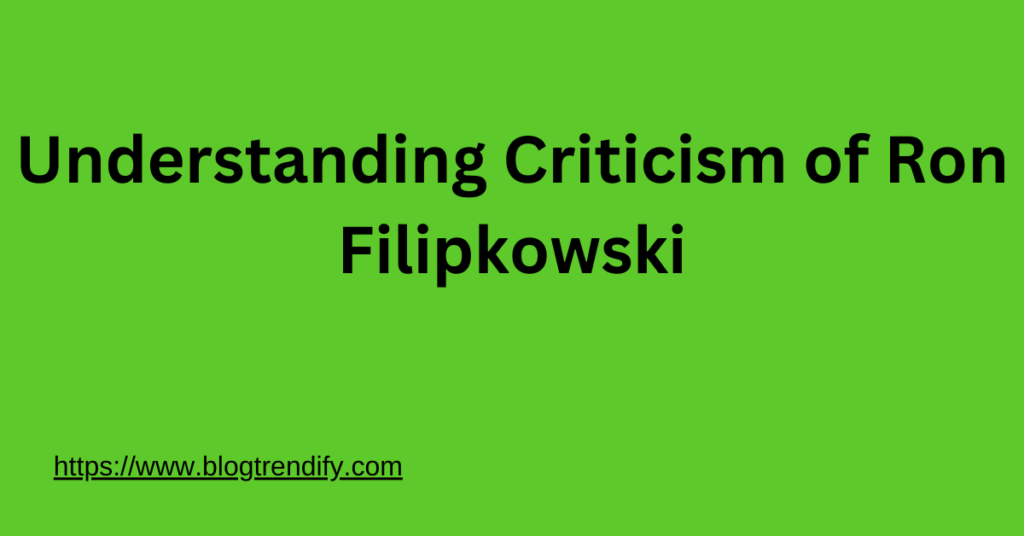Understanding Criticism of Ron Filipkowski
Table of Contents
ToggleExplore the complexities of Ron Filipkowski’s criticism. Delve into various perspectives and insights that shape the discourse surrounding his work.
Ron Filipkowski, a prominent attorney, political commentator, and social media personality, is no stranger to criticism. His bold opinions, public stances, and legal career have made him a target for detractors across various spheres. To better understand the nature of the criticism he faces, this article explores the roots of such critiques, his responses, and the broader implications of these disagreements.
Who Is Ron Filipkowski?
Ron Filipkowski has built a career as an attorney and advocate, gaining attention for his public resignation from Florida’s 12th Circuit Judicial Nominating Commission. A vocal critic of political and social issues, his online presence has garnered both support and condemnation, making him a polarizing figure in modern discourse.
Sources of Criticism
1. Political Allegiances
Ron’s outspoken criticism of political leaders and policies has sparked significant backlash.
- What Critics Say:
Many accuse him of bias, alleging that his commentary serves to further a specific political agenda. - Context:
As an advocate for accountability, Ron’s comments often target powerful individuals and controversial policies, naturally inviting opposition.
2. Legal Decisions
His career as an attorney has not been free from scrutiny, particularly regarding his involvement in sensitive or high-profile cases.
- What Critics Say:
Detractors argue that his legal strategies sometimes appear overly aggressive or self-serving. - Context:
Ron counters this by emphasizing his commitment to justice and adherence to ethical standards.
3. Social Media Presence
Ron’s active engagement on platforms like Twitter (X) has made him a visible figure but also a frequent target.
- What Critics Say:
Some claim his posts are overly provocative or divisive. - Context:
His supporters argue that his social media activity sheds light on critical issues often overlooked in mainstream narratives.
Ron Filipkowski’s criticism
Understanding the Criticism
1. Polarization in Public Discourse
Ron’s critiques often fall along partisan lines, which can alienate individuals on opposing sides of the political spectrum.
2. Public Life and Visibility
As a public figure, Ron’s actions and statements are scrutinized more intensely than those of private citizens.
3. The Nature of Advocacy
Advocating for change and accountability can be inherently contentious, as it challenges established norms and systems.
Ron Filipkowski’s Responses to Criticism
1. Transparency and Engagement
Ron actively addresses criticisms by explaining his stance in interviews, social media posts, and public appearances.
2. Staying Grounded in Principles
He emphasizes that his actions are guided by principles of justice, fairness, and truth, regardless of public opinion.
3. Constructive Dialogue
Rather than dismissing dissenting voices, Ron often engages with critics to clarify misconceptions and foster understanding.
Impact of Criticism on Ron Filipkowski’s Work
1. Strengthening Advocacy
Criticism has pushed Ron to refine his arguments and further solidify his positions, enhancing his advocacy efforts.
2. Expanding Visibility
Controversies and debates have amplified Ron’s reach, enabling him to connect with broader audiences and spread his message.
3. Inspiring Supporters
For many, Ron’s resilience in the face of criticism serves as an example of integrity and determination.
Lessons from Ron Filipkowski’s Experience
1. Constructive Use of Criticism
Ron’s approach demonstrates how criticism, when handled constructively, can be a tool for growth and advocacy.
2. Importance of Staying Authentic
Despite opposition, Ron remains true to his beliefs, highlighting the value of authenticity in public life.
Conclusion
Criticism is an inevitable part of being a public figure, particularly one as vocal and principled as Ron Filipkowski. While his detractors may challenge his motives or methods, his ability to engage with criticism constructively reflects his commitment to advocacy and justice. Understanding the nuances of this criticism provides a clearer picture of his journey and the values that drive him.
FAQs
1. Why does Ron Filipkowski face criticism?
His outspoken political opinions, legal career, and social media presence make him a polarizing figure, drawing criticism from various groups.
2. How does Ron respond to critics?
Ron actively engages with criticism through public statements, clarifying his positions and addressing misconceptions.
3. What role does social media play in the criticism he faces?
Social media amplifies both his voice and the criticism, as his posts often spark debates on controversial issues.
4. Has criticism affected Ron Filipkowski’s career?
While criticism has added challenges, it has also increased his visibility and strengthened his advocacy efforts.
5. What can we learn from Ron Filipkowski’s handling of criticism?
His resilience and constructive approach to criticism underscore the importance of authenticity and principles in public life.




